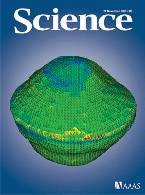2006年VOA标准英语-Scientific Magazine Acts to Restore Public Conf(在线收听)
By Jessica Berman
Washington
29 November 2006
The well-known scientific journal Science should require more information from authors, especially if their papers are likely to generate a lot of public attention. That's the conclusion of an independent panel that investigated the publication by Science of fraudulent stem cell research. VOA's Jessica Berman reports.
In 2005, the scientific community was outraged when it learned of one of the most high profile fraud cases in history: a group of researchers, led by South Korean biomedical scientist Hwang Woo Suk, claimed for the first time to have derived stem cells from the cloned embryos of 11 patients.

Radar-derived model of Alpha, larger half of the binary near-Earth asteroid on cover of Nov. 2006 issue
Stem cells can potentially be manipulated to develop into any tissue of the body, and the news suggested that scientists had jumped a major hurdle in customizing the growth of new organs to replace diseased ones.
The landmark research was published by Science. But there was one problem. Most, if not all, of the embryos turned out to be fake or never existed at all.
"The fraud was so convincing that peer reviewers didn't catch it, that many U.S. scientists who had heard the work described at small meetings in great detail by Hwang and his collaborators and U.S. scientists who had visited that laboratory in South Korea were surprised and even astonished when the work turned out to be fraudulent," said Donald Kennedy, editor in chief of Science.
The magazine assembled an independent assessment committee to investigate the fraud.
The reviewers concluded that, with the pre-publication review process the magazine used, it was unlikely Science could have detected the deception.
The committee said the system Science has used is based on trust, in which editors merely look for flawed experiments and inconsistencies with other related research.
The committee is recommending that the editors of Science add a strong dose of skepticism when reviewing articles, particularly high-profile research, and that includes asking the authors for the source of their information and insisting that they provide complete data.
John Braumann, the chair of the independent assessment committee, says around 10 articles a year are submitted to Science for publication that probably should receive this kind of scrutiny but, even with stricter editorial oversight, he says the system is not perfect.
"We can ask for more detail when necessary," he said. "But none of us think[s] that all fraud can be detected. But we do think it can be deterred."
Because of the high profile nature of some of the studies, Braumann says some scientists may try to gain personal recognition or financial gain by misrepresenting their work.
"And we're concerned that science continue to be viewed by the public as an enterprise in which truth is paramount," he added.
Science editor Donald Kennedy says the magazine is now creating a screening process for high-profile research papers, including those dealing with stem cells and global warming, while it considers whether to adopt other measures.